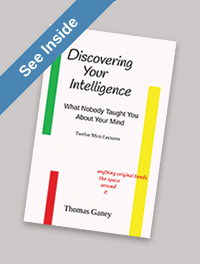A Conversation with Thomas Ganey
Thomas Ganey is the author of Discovering Your Intelligence: What Nobody Taught You About Your Mind. He explains why, from his book’s perspective, being smart or having a high IQ is not enough to qualify a person as intelligent. Professor Ganey extends his thinking to the role of the schools, insisting that schools and colleges need to remake their curricula in educating for intelligence. This interview is adapted from his forthcoming book Teaching the Twelve Qualities of Active Mindpower: Educating Students in Applying Intelligence.
A: Because of its impact, and because many people lack a good understanding of what it is. The average graduate, high school or college, has received little real instruction in intelligence and what it requires. Yet it’s extremely important—to any person in life, and to our society.
A: An adequate definition is deceptively simple. I’ve written in my book Discovering Your Intelligence that it’s “the mindpower you apply for good results in the things you do.” What makes that complicated is that it demands a lot of a person in terms of performance. Why? Because living is complex, and if you’re going to get good results from your thinking in the broad areas of your life, you’ll have to bring into play more than one or two powers of mind, however strong those powers may be. In particular, I’ve named twelve cardinal powers that make for intelligence; they are mental qualities and they have to work together.
A: Intellectual energy, openness, perceptiveness, objectivity, exactness—self-awareness, above all. History offers us many good examples of individuals who exhibited in their persons the cardinal qualities of intelligence. Benjamin Franklin comes to mind. Also Abraham Lincoln. But let me clarify, just looking around at people today. Many people who are smart are not intelligent because they lack the scope or range of qualities I’m talking about. They are smart, yes, but not intelligent. Such a person may lack openness, for example; he may be quick-witted but closed to unfamiliar points of view. Or he may lack other crucial qualities. Really, most persons we loosely call intelligent are not intelligent from a genuine perspective.
A: It’s a superior standard. But if intelligence is to mean something in our culture, it should embody a true standard of excellence. And everybody should know what is required by it. That’s why I define intelligence very specifically in terms of powers or qualities. When you know what they are and how they pertain, then you have something to aspire to.
A: A whole industry has built up around IQ tests. The truth is, IQ is invalid as any sort of standard for applied intelligence, by which I mean mindpower as it is actually exercised in life. Your IQ tells you nothing about your creativity or your practical thinking or the way you reason with others, among other things. A fellow with a high IQ may very well think himself brighter than he actually is. Which is unfortunate because it may prevent him from recognizing that he should improve and how, actually, he could improve. Realize—IQ theory centers on testing; it’s pretty much about assessment; it’s not a developmental theory, which is to say it does little in telling anyone how to improve. That limits its usefulness in the schools, where students really do need a curriculum toward intelligent thinking.
A: No. Emphatically no. That includes the colleges and universities. You’ll find instruction in creative thinking there, and in critical thinking, and the student will learn something there about intelligence in certain disciplines like psychology, but none of it is brought together into a package so that the student may gain a thorough concept of intelligence and its requirements. I raise the question in Discovering Your Intelligence. Where in an education is the student of suitable promise given training and exercise in the major powers of intelligence, or schooled in the habits of intelligence, or schooled in intellectual character, or taught the nature of the mind and how to use it—taught so much else that makes for effective intelligence? Typically, the graduating student at any level possesses neither the understanding of intelligence nor the scope of intellectual behaviors that would satisfy an adequate standard in this arena.
A: One big solution. Toward an effective remedy in education, I stress that applied intelligence should be taught as a separate discipline in the schools, much like math or English or history. The student would learn in a most complete way what it is to think intelligently and to be an intelligent person. My book explains a lot of what I’m referring to, presenting concepts like character in reasoning and control and reframing and target awareness. The learning I envision would occupy the very center of a liberal education. I describe this learning in great detail in a coming book for teachers and others who care about education . . . Teaching the Twelve Qualities of Active Mindpower: Educating Students in Applying Intelligence.

thomas@discoveringyourintelligence.com